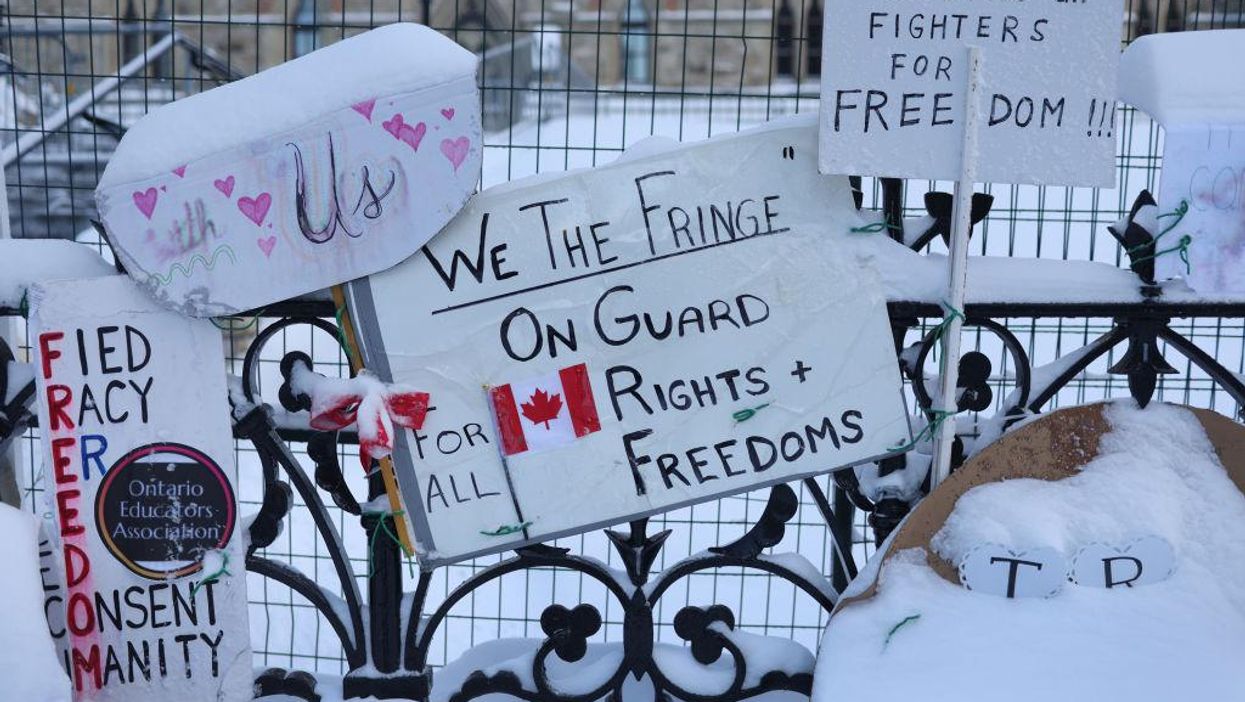
Scott Olson/Getty Images

Canada's Parliament will not meet Friday to debate the emergency powers Prime Minister Justin Trudeau invoked on Monday because of a "police operation" to clear out the Freedom Convoy protesters in downtown Ottawa.
The House of Commons was supposed to continue debate on whether to affirm the use of the Emergencies Act to crack down on the anti-vaccine-mandate protests. But in a message to lawmakers, House Speaker Anthony Rota announced the House will not sit because "a police operation is expected to take place on Wellington Street and other locations in the downtown core of Ottawa."
"Given these exceptional circumstances, and following discussion with all recognized party leadership, the sitting today is canceled," Rota announced.
The Canadian Parliament\u2019s sitting has been cancelled today \u2014 a day where MPs would have been able to challenge Trudeau\u2019s use of the Emergencies Act \u2014 using the police operation against the protesters as justification.https://twitter.com/HoCSpeaker/status/1494646506770600000\u00a0\u2026— Anthony Furey (@Anthony Furey) 1645186923
Police began arresting Ottawa protesters Friday as authorities prepare to remove the more than 300 trucks that remain downtown, where they have disrupted traffic for weeks. The arrests come after the Emergencies Act gave law enforcement additional powers to fine and imprison those involved with the protest.
The emergency declaration stipulates that demonstrators cannot protest on Parliament Hill or in the parliamentary precinct, at hospitals, airports, trade corridors, bridges, and the area around infrastructure for water, gas, sanitation, and telecommunication utilities.
Protesters have been barred from bringing children under the age of 18 to the demonstrations; foreign nationals cannot enter Canada to participate in or facilitate an "illegal assembly"; and banks and insurance companies have been authorized to freeze participants' accounts and cancel their vehicle insurance without a court order.
Since the emergency went into effect, blockades at border crossings in Ontario, Manitoba, Alberta, and British Columbia have been cleared out, with the last stronghold of the convoy remaining in Ottawa.
Parliament began debating the use of the Emergencies Act on Thursday and is scheduled to continue debate until Monday evening, when the House will hold a vote.
Under the law — which grants the government significant powers to curtail civil liberties to protect national security during an emergency — Parliament must consider the invocation of emergency powers within seven days, or it will expire. If either the House of Commons or the Senate of Canada votes against the motion to confirm the declaration of an emergency, the emergency will end.
On Wednesday, Trudeau's Liberal government published its reasons for declaring an emergency, calling the protests taking place across the country "concerning, volatile and unpredictable."
"The protesters have varying ideological grievances, with demands ranging from an end to all public health restrictions to the overthrow of the elected government," the government claimed.
"Ideologically motivated violent extremism adherents may feel empowered by the level of disorder resulting from the protests," it asserted.
Public Safety Minister Marco Mendicino said earlier that day that several individuals involved in a blockade of the border crossing in Coutts, Alberta, have "strong ties to a far-right extreme organization with leaders who are in Ottawa."
Four border protesters were arrested there and have been charged with conspiring to murder Royal Canadian Mounted Police officers and possession of a weapon for dangerous purpose.
But Mendicino did not elaborate on which "far-right extreme organization" the protesters were connected with.
During heated debate Thursday, Trudeau's ministers faced sharp criticism from Conservatives who demanded evidence to support the government's accusation that "ideologically motivated violent extremism" is present at the protests, according to CBC News.
"Parliamentarians deserve real evidence, not conjecture, from this minister before we can ever contemplate suspending the rights of Canadians," Conservative MP Dane Lloyd, the opposition's emergency preparedness critic, said.
Trudeau began debate by calling the protests and blockades illegal and dangerous.
"For the good of all Canadians, the illegal blockades and occupations have to stop and the borders have to remain open," he said.
"The blockades and occupations are illegal. They're a threat to our economy and [our] relationship with trading partners. They're a threat to supply chains and the availability of essential goods, like food and medicine. And they're a threat to public safety."
Interim Conservative leader Candice Bergen countered by calling Trudeau's decision to declare an emergency "extremely disappointing" and arguing that the prime minister took an extreme measure without preliminary action.
"We want to lower the temperature across the country. The prime minister clearly wants to raise it," Bergen said.
She called on the New Democratic Party to join the Conservatives and the Bloc Québécois in voting the declaration down, but NDP Leader Jagmeet Singh rebuffed her.
"The interim leader of the Conservative Party says, 'We have heard you, we will keep standing up for you.' Do you regret endorsing a convoy that is attacking the fundamental democracy of our country? Do you regret endorsing and supporting an occupation that has harassed citizens?" Singh said during debate.
He later told reporters that the NDP will vote with the Liberals to support the emergency declaration, but with certain conditions attached.
"We are ready to pull our support if we no longer need to continue, if the measures are no longer necessary, or if the government adds powers," he said.